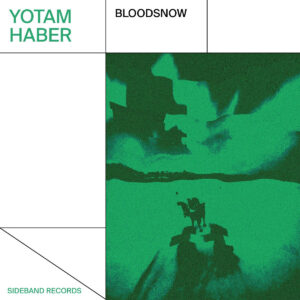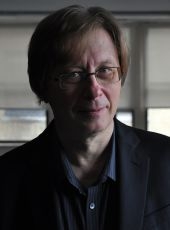Yotam Haber
Bloodsnow
Sideband Records
Taylor Ward, Baritone; Don-Paul Kahl, Alto Saxophone
Talea Ensemble, James Baker, conductor
American Wild Ensemble
Composer Yotam Haber’s Bloodsnow is based on life events and contemporary concerns. The title work was from a harrowing experience. Haber was caring for a friend’s sled dogs during her first Iditarod, and sustained a serious injury to his finger. The blood mixing with snow, the fear of finding treatment for the wound, and the sense of dizziness from blood loss are all musically depicted with bracing verisimilitude. Talea Ensemble, conducted by James Baker, catches every nuance of its quixotic span.
Foreboding bass winds and dampened piano percussion open the piece. Blurry runs and woodwind multiphonics add a sense of disassociation. Harp glissandos and piano clusters further depict the ambience. A high violin, syncopated piano runs, and upper winds, imitating the previous low winds’ material, move the piece into a second section, closely followed upon by jazzy bass clarinet, thrumming piano notes in its low register, and prestissimo string runs. The eye of the hurricane features extended triadic harmonies from the piano and hushed strings. With suddenness, this moves back to the previous aggressive demeanor, with keyboard stabs and swelling string chords. The digressive nature of these sharp turns seem to embody the frantic mood of someone bleeding. Even the occasional musical oasis makes sense; the woozy figures depicting the blood loss into the snow. Ascending piano chords and darting winds suggest a denouement, but a coda of bustling energy, with cascading runs in the piano mirrored in the other instruments, then abruptly ending, concludes the piece with a satisfying surprise.
Baritone Taylor Ward joins the ensemble to sing They Say You Are My Disaster, a set of two songs with texts by women from different generations. “Schnitzel,” by Dorit Weisman, combines two different through lines: breast cancer surgery and meal preparation. The music veers between violence and quietude, with Ward displaying a wide range and impressive dynamic control. “Oh, My Bank” by Tahel Frosh again deals with two subject matters, both giving rise to the narrator’s anger: the repressive nature of late capitalism and the role of women in such a society. Snarling Sprechstimme and disjunct lines from Ward are accompanied by a bass clarinet solo, in similarly high dudgeon, and powerful instrumental swells. The coda initially quiets these elements, with one final vocal cry and a crescendo leaving a sense of ominousness in the song’s wake.
Resistance is an extensive piece for solo saxophone, played by Don-Paul Kahl. It is filled with special techniques, percussive pops, aggressive growls, microtones, and multiphonics, to name a partial list. There is much shifting between a number of melodic cells, with mercurial changes between jazzy runs and combustible angularity. However, it is the melodies submerged beneath these playing methods, visible at the edges and seemingly trying to find their way to the surface of the texture, perhaps a titular metaphor, that allow Resistance to transcend its formidable technical demands to become a work of rich expressiveness.
The recording closes where it began, in the Alaskan wilderness. The ensemble work Choref is about Haber’s week spent hiking in Wrangell-St. Elias. Its two demeanors picture the stillness of the surroundings with slow, sustained harmonies, and the burbling vitality of life that persists, even in such conditions. As the piece moves through its trajectory, what began as two distinct sectional boundaries are commingled into music of varied textures, with bustling woodwind bird calls, high modal lines, sepulchral bass clarinet, string tremolos, and intricately constructed harmonies.
Haber’s music revels in complexity that is in service of larger narratives, never for its own sake. He is an imaginative and skillful creator, willing to look at his own terror alongside the peace of nature, managing to make them pieces of a whole.
-Christian Carey




